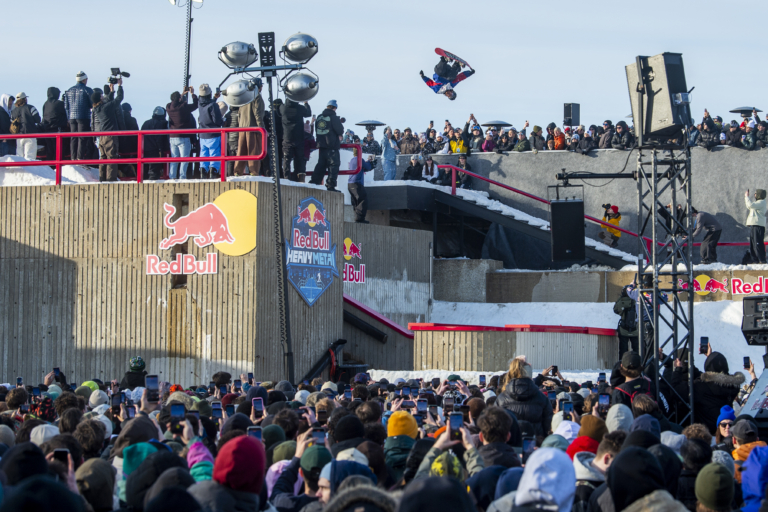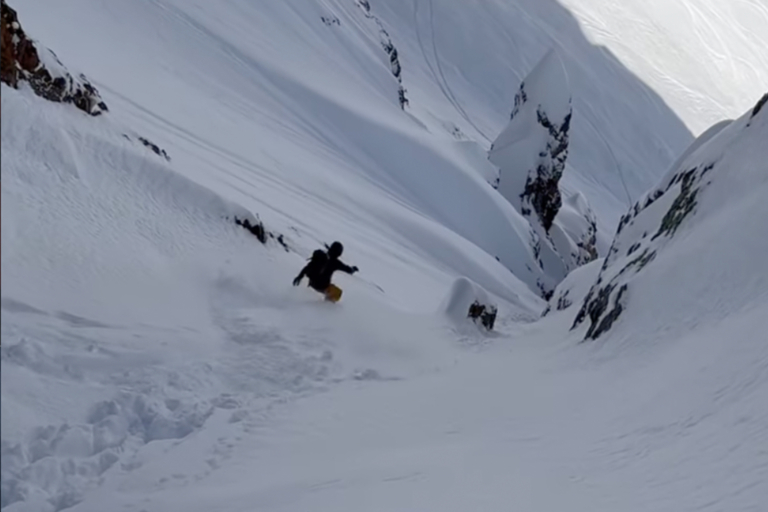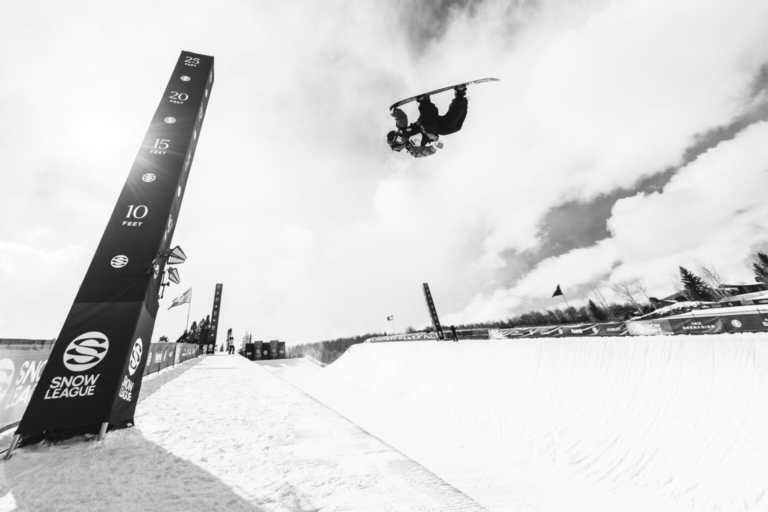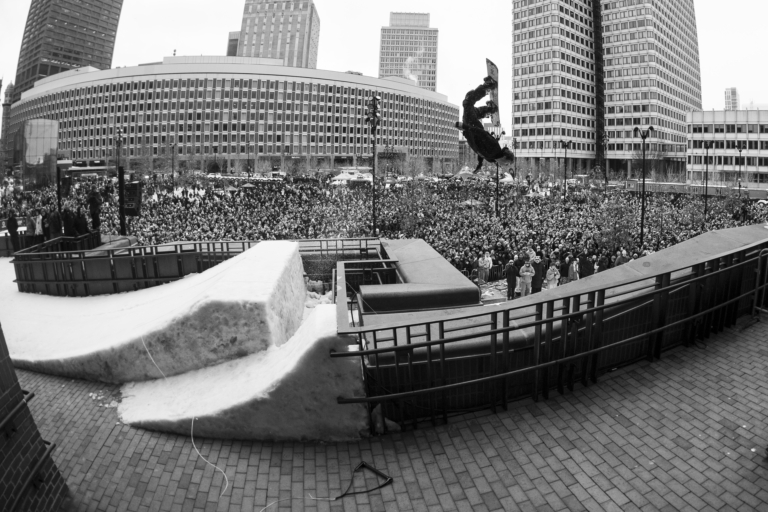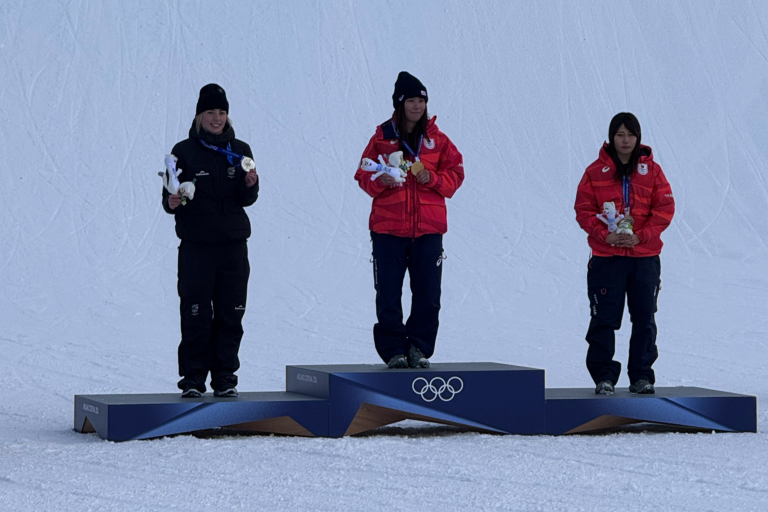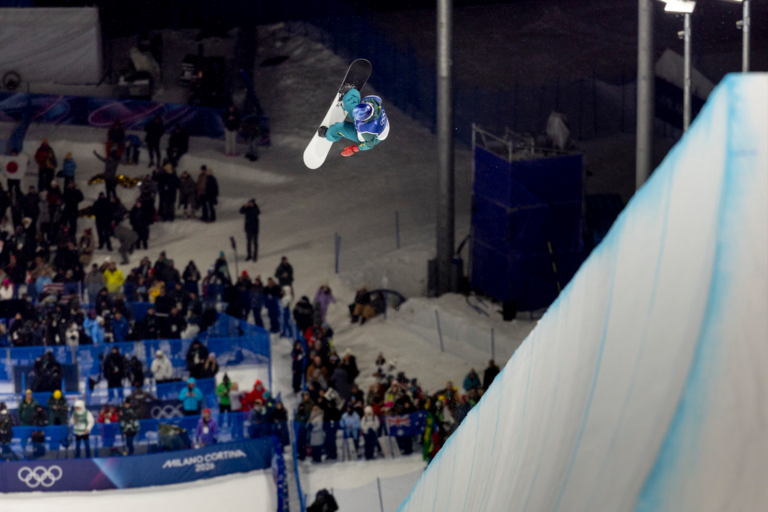“As snowboarders in the spotlight, we’re in a unique position to influence the younger generation and it’s up to us to decide how we want to use that influence.”
Watching Gus Warbington snowboard, his unique perspective is the first thing you notice–well, that and his innately smooth board control. His preference for features is one-of-a-kind (watch his part in Everybody, Everybody for a glimpse into his aesthetic) as he gravitates toward the line less taken, exposing tricks via a considered flow. Growing up on the terrain of Oregon’s Mt. Bachelor served to further amplify his ease on just about anything he rides and now, spending winters in Salt Lake City has allowed him to apply his PNW finesse to the Wasatch. An introspective individual, Gus’ thoughtfulness is visible in his riding, but of course is foundational to his words and actions. Case in point, he’s dedicated to wearing a helmet when he snowboards, not just to protect his physical and mental health (he’s the first to explain how intertwined brain health and mental health are), but also because he remembers how impactful it was for him to see pro snowboarders wearing helmets when he was a kid. “Growing up, I idolized pro snowboarders and wanted to copy their styles and pretty much do everything that they did,” says the 686 team rider. “I’m sure kids now think the same way, so if they see their favorite snowboarders rocking helmets regularly, hopefully they won’t think twice about putting one on. Basically, I just want people to realize that protecting our brains and looking cool don’t have to be mutually exclusive, and if I can play any small part in kids having that realization, that’s awesome.”
It was this outlook that led Gus to join Save A Brain as a team rider. “Gus was one of the first additions to the Save A Brain team and it was seriously a no brainer, HA!” says SAB founder Kelsey Boyer. “He has been leading the charge and creating a path through his career while wearing a helmet and actions speak louder than words in today’s society. His story and perspective on helmet wearing is unique and his voice is so powerful as we create this movement.”
October is Mental Health Awareness Month and for this special Save A Brain feature, Gus talks about his feelings on wearing a helmet; why it is important to him; the connection between concussions and mental health, specifically relating to an injury he sustained earlier this year; and much more. Take it away, Gus.
Top photo: Erik Hoffman
Save A Brain: How long have you been snowboarding and where is your home resort?
Gus Warbington: I’ve been snowboarding since I was 6, so about nineteen years. Home resort, and still my favorite place to ride, is Mt. Bachelor.
Ever since I have known you, you have always worn a helmet. What has motivated you to keep wearing one?
My early motivation was definitely from my parents. They would support mine and Max’s dreams of snowboarding with the caveat that we had to wear helmets, and I was always totally cool with that. It made sense to me even from an early age, and I always found it comfortable, particularly at Bachelor because we had so many gnarly weather days growing up and I liked the feeling of being all covered up and stormproof in a helmet and facemask. So basically, I didn’t second guess it at all when I was little, but definitely as I got into my teenage years and had sponsors and was starting to film and stuff, I was starting to feel some pressure to take it off because very few pro snowboarders were wearing helmets. Big shout out to the ones that were wearing one, by the way, like Jed Anderson and Jesse Burtner. I looked up to those guys a ton and they made helmets look so cool to me. I also always thought Chris Dufficy had sick style and he wore a helmet, so we had some sick people to look up to, but it was definitely a small group.
I would also hear stories of people not getting coverage in magazines and videos and shit if you were wearing a helmet, so even though I found it completely ridiculous and irresponsible of the industry to function like that, it was hard not to start tripping and wondering if my helmet was affecting my success as a snowboarder. At the peak of my concerns about this I was probably like 14-15 and was definitely considering wearing the helmet less and less when filming and shooting photos. Then, in 2011, my snowboarding idol and friend, Aaron Robinson, died hitting his head on a rock in the backcountry and that whole situation affected me in a really profound way. I obviously can’t speculate on whether a helmet would have changed what happened, but it just brought the dangers of snowboarding and the fragility of life back to the front of my mind. I stopped tripping about what the snowboard industry thought about helmets and after that, absolutely nobody was going to tell me not to wear one.
How do you think we can begin to change the helmet stigma?
I think it starts with visibility. Basically, just more professional and sponsored snowboarders wearing helmets, making them look good, and talking about why they do it. I think bringing mental health into the conversation is a very critical component to that and it’s something that is not talked about nearly enough. It’s really great to see that athletes and society in general are beginning to open up more about topics like depression and anxiety, but I very rarely hear concussions and head trauma and how detrimental those things can be to our mental health brought up in those conversations. We have to fight the mental health crisis we are in with as many different tools as we can and protecting our brains from injury is a very important component to that. As snowboarders in the spotlight, we’re in a unique position to influence the younger generation and it’s up to us to decide how we want to use that influence. That means a lot of things to me, but making helmets look cool ranks pretty high on that list.
I don’t want to sound too preachy about it because at the end of the day it’s a personal choice and I definitely don’t judge or look down on people who don’t wear helmets, but I do want to lead by example with the goal that maybe some people’s minds can be changed and we can slowly start chipping away at the stigma and begin changing the culture’s attitude. Growing up, I idolized pro snowboarders and wanted to copy their styles and pretty much do everything that they did. I’m sure kids now think the same way, so if they see their favorite snowboarders rocking helmets regularly, hopefully they won’t think twice about putting one on. Basically, I just want people to realize that protecting our brains and looking cool don’t have to be mutually exclusive, and if I can play any small part in kids having that realization, that’s awesome.
What do you look for in a good helmet?
I look for something comfortable, not too loud or bright, and something works with the rest of my setup. I wear the Pro-Tec Full Cut helmet, which has padding over the ears, and I’m a huge fan of that style. I think it looks cool and It’s just safer because there’s a bigger surface area of padding, and it’s quite a bit warmer on stormy pow days. I love the feeling of being protected from the elements and when you ragdoll, you don’t lose all your shit in the process. Anyone who’s lost their hat and goggles in a tumble on a pow day knows how much of a day-ruiner that can be. Having a good-fitting, compact helmet setup is a game changer for that reason alone.
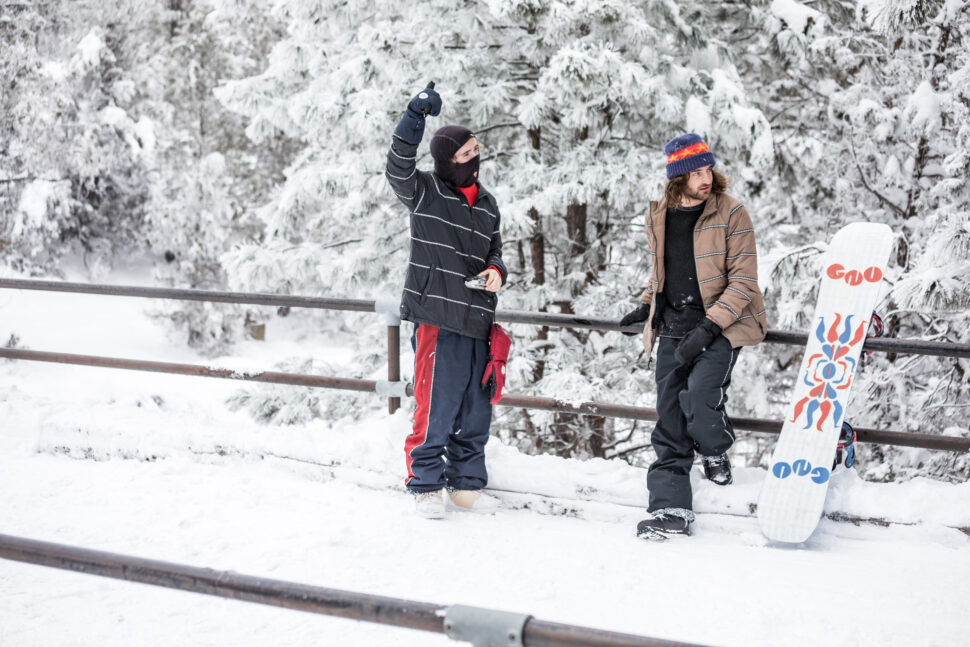
Head injuries are a part of the lives that we lead within action sports, have you experienced any lingering effects from concussions over time?
Up until earlier this year I had been fortunate enough to avoid any serious head injuries and I attribute a lot of that to my being so adamant about helmet-wearing. However, in April of this year while up at Mt. Baker working with my brother on his Brain Bowl event, that lucky streak ended. For some reason I wasn’t wearing my helmet much that week. I tried rationalizing my logic in all sorts of ways, but really, I don’t know what I was thinking. It was in the spring, so the weather was hot, the course was small, the snow was soft, and I was hiking and building a ton, so my helmet felt more uncomfortable than usual in that setting, and I just thought it was a safe enough setup to not worry about it too much. Of course, I was wrong about that and at the end of the very last day of the event, I took a brutal slam and whiplashed my head really hard into a wall of hardpacked snow. I got a pretty bad concussion and did something to my neck that I’m still trying to figure out and recover from to this day, almost six months after the slam.
Having dealt with depression for most of my life and knowing how much damage a head injury can do to your mental well-being, I was really afraid and fucked up from the whole situation. Up to that point I was having an awesome season and was still kind of riding the high from all the fun snowboarding I got to do over the winter, but just as I feared it would, the injury brought my depression back with a vengeance and I’ve had a tough spring and summer trying to recover and make sense of it all. I was also very much in denial about the severity of the injury, mainly I think because I felt so guilty and hypocritical about not wearing a helmet when it happened. I didn’t really tell that many people about it, mainly because I wanted to avoid the inevitable “But you were wearing your helmet, right?” conversation. So other than talking about it with family and a few close friends, I pretty much just suffered in silence and spent a ton of time on my own, which is never the right thing to do.
Thankfully I had the support of my family and I spent all summer back home with my parents in Oregon to get some healing done and try to get my head back in a better place. I knew how serious head injuries are and how vulnerable they can make you to re-injury, so I took my recovery super seriously and basically just did nothing but rest my head and neck all summer. I’m happy to report that most of the concussion symptoms have mellowed out and my head is slowly but surely coming back to health. My neck, however, is still unfortunately not healing properly and after going to several doctors and physical therapists over the summer I’ve made little progress and I’ve yet to figure out exactly what is going on. I got to do a little bit of boarding at Woodward Copper this summer, but I think that was ultimately a mistake because it got quite a bit worse after the trip and kind of became a major setback in my recovery. I have more doctor appointments coming soon to hopefully get some clarity on what exactly is going on and how to proceed from here, but I’m hoping for the best and that I’ll be able to get back to boarding soon.
I’ve learned some valuable lessons from this whole situation, and I will most definitely wear my helmet religiously from here on out, regardless how “safe” I might think the session is. I know injury is a part of snowboarding, helmet or not, but this experience has taught me to never let my guard down and has given me yet another harsh reminder just how serious and life altering a head injury can be.
Everyone’s toolboxes are compiled of different tools to combat life today. What specific tools do you practice to take care of your mental and brain health?
These days I have a lot of different tools to keep me going and help me take care of my mental health. In my particular case, therapy and medication have been huge for me, as well as just talking to friends and family as much as possible and listening to tons and tons of music. Besides those things I’d say my biggest savior in keeping my head above the surface and helping me avoid falling into a much deeper depression is my morning routine. I know that might sound ridiculous, but I’ve learned over the years that my depression thrives on idle time and becomes the worst when I have no plan for the day. If I have too much time on my hands with no plan and nothing to work towards, I use all my brain power wondering what I should be doing with my day, and that spirals to what I should be doing with my life in general, and I end up paralyzing myself with my thoughts and I get nothing done. My routine has kept me from going down that route too often and keeps me from feeling really bad about my day and in turn, myself.
My basic routine, unless I’m on a trip or have a super busy day planned, is I do some mellow physical therapy in the morning after breakfast, then meditate for 10-15 minutes, then do some Spanish lessons on my phone, then read for a while and try to get some writing done. If I can get that sequence of things accomplished in the morning, I’ll feel tons better and even if I get nothing else productive done with the rest of my day, I’ll at least feel like it wasn’t a total waste because I cleared my head, helped my body heal, worked on something creative, and hopefully learned something new. Because that stuff has been built into my routine for years now, it feels totally natural and I don’t really think twice about doing it, which I think is really the key to turning these things into lifelong habits rather than phases. Even though it still has been far from easy and depression still takes control some days, having done the work of building up this routine prior to being forced into all this downtime has saved me from suffering a lot more from this injury and from the pandemic in general. I know I have something healthy to fall back on when times get rough and I’m eternally thankful for that.
Of course, I stick to this routine a lot more consistently in the off-season because most mornings in the winter are spent snowboarding, but I definitely see that as a form of meditation and I know it’s as good for my mental health as anything I could do, so I don’t trip on skipping out if I’ve been lucky enough to spend a day in the mountains doing what I love the most. I still have a long way to go with this stuff and with my mental health in general, but I know for sure that I would be a lot worse off if I didn’t have these tools to keep me going. This might sound a little corny but having all these ups and downs recently has made me really, really thankful for the good times and has given me some potent doses of perspective which is one of the most valuable things you can get in life. I have so much to be grateful for. Even though it’s felt like a struggle recently, I know I’ve bettered myself a lot during all this downtime, and once I get this injury figured out and can get back out into the world I’ll be coming at things with a whole new perspective, so I’m looking forward.

